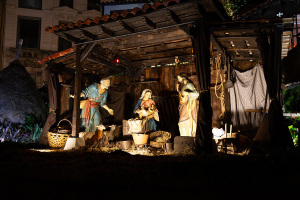Why Jesus Is No Longer the Only Way for Many American Christians
Finding a Fuller Gospel
While this grappling with postmodernism will remain a negative for evangelicals because it's "uncomfortable" and "does disrupt the way that evangelicals have traditionally understood how they express their faith," Teasdale believes it can result in a positive outcome.
"The reason for that is what it's doing is that it's stripping away a lot of the old debate that I think had in some ways come to the place of defining how people thought broadly about the Christian faith. It's science or it's faith, for example. You can either believe this way or that way. Everything is said in very stark contrasting terms and that's the logic of modernity where things are said in those dichotomies," Teasdale argued. "This allows for, I think, more nuance."
Instead of, for example, using old style propositional evangelism — "God loves you and has a very wonderful plan for your life; we've all sinned; Jesus was given to us as a way to move passed that sin; if we receive Him then we're able to enter into that plan" — evangelicals can go back to the Bible and develop a more "robust" and "fully biblical" type of evangelism, Teasdale explained.
"Jesus teaches yes, that we need to be forgiven for sins, no question about that. But Jesus also calls us to love our neighbor. Jesus also calls us to live in community with one another. And so I think that what the shift to postmodernity and finding meaning has done is open the door for evangelicals to find new and more robust and more fully biblical [evangelism], to be honest. To go back to the Bible and rediscover how much fuller the Gospel is that they're supposed to be living out and inviting others to share," he said.
Especially among more highly-educated Christians, the professor explained, there has been a lot of re-examination on the state of the American church, particularly in the era of President Donald Trump, who was largely supported by white evangelicals.
"I think the more educated folks that are in the evangelical camp are doing a lot of soul searching," he said.
Teasdale, who is also a fellow at the Billy Graham Center for Evangelism at Wheaton College, said he gets together with scholars at the institution about twice annually to share research. The discussions that have emerged about the meaning of the term "evangelical" since Trump's election, he said, have been "fascinating."
"Most of us are scholars who teach evangelism. We're all evangelical of some stripe or another. We discussed an awful lot. Can the term evangelical be used effectively anymore because it got so tainted? ... and it's not a matter of saying whether we agree with the core Gospel," he said.
A Minority Lens
Looking at ways Bible-believing Christians can better frame their narrative in a postmodern society, Teasdale suggested they would be better served by acknowledging themselves as minorities in American culture.
"I think the church in the United States needs to learn from the churches in the rest of the world and understand what it's like to be a minority religion. I think that one of the things that continues to afflict the church in the United States is the belief that we still hold the cultural authority that we did in the 19th century. And we don't and we haven't for quite a while," Teasdale said.
"We still have all these big buildings and we still have lots of people working within the institutional churches and I think that we don't realize the extent to which we've lost the cultural authority that we used to have.
"I think we would do well to learn from churches that have always been minorities in their cultures so that we understand the way that we would be more effective in approaching the rest of our culture in a way that promotes dialogue, in a way that promotes hospitality in a way that demonstrates our love but recognizes we are coming at it from a position that is a minority position."
When it comes to home-grown examples of ministry, Teasdale pointed to the black church and immigrant churches as good examples of Christians who have managed to remain faithful to Scripture despite the cultural shift.
"I think we can learn a lot from immigrant churches, from black churches and others that have had to be in a minority status already in the United States, have had to figure out how to operate within the larger cultural setting. I think the larger white mainline and white evangelical churches just are kind of clueless about the fact that we aren't in this cultural authority position anymore and we need to back off and learn how to be gracious in a minority position. I think we would be more effective that way," he said.
In addition to learning how to operate like a minority, Teasdale suggested that high-profile internal disagreements among Christian denominations also need to be handled more discreetly.
"We need to find a way to deal with our stuff and get passed that because we're hurting the larger witness of Christ not only by being in disagreement with each other but by vocally and visibly being in disagreement with each other. We won't always agree, I understand that. But we're doing it in such a bitter and petty way that people don't actually believe that we teach that God is love because we don't demonstrate it," Teasdale said.



























